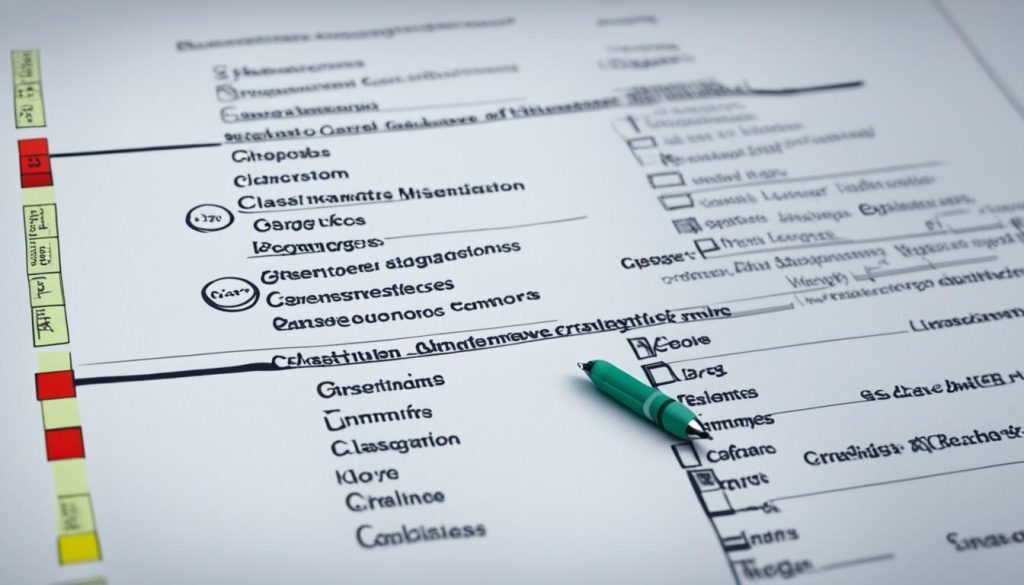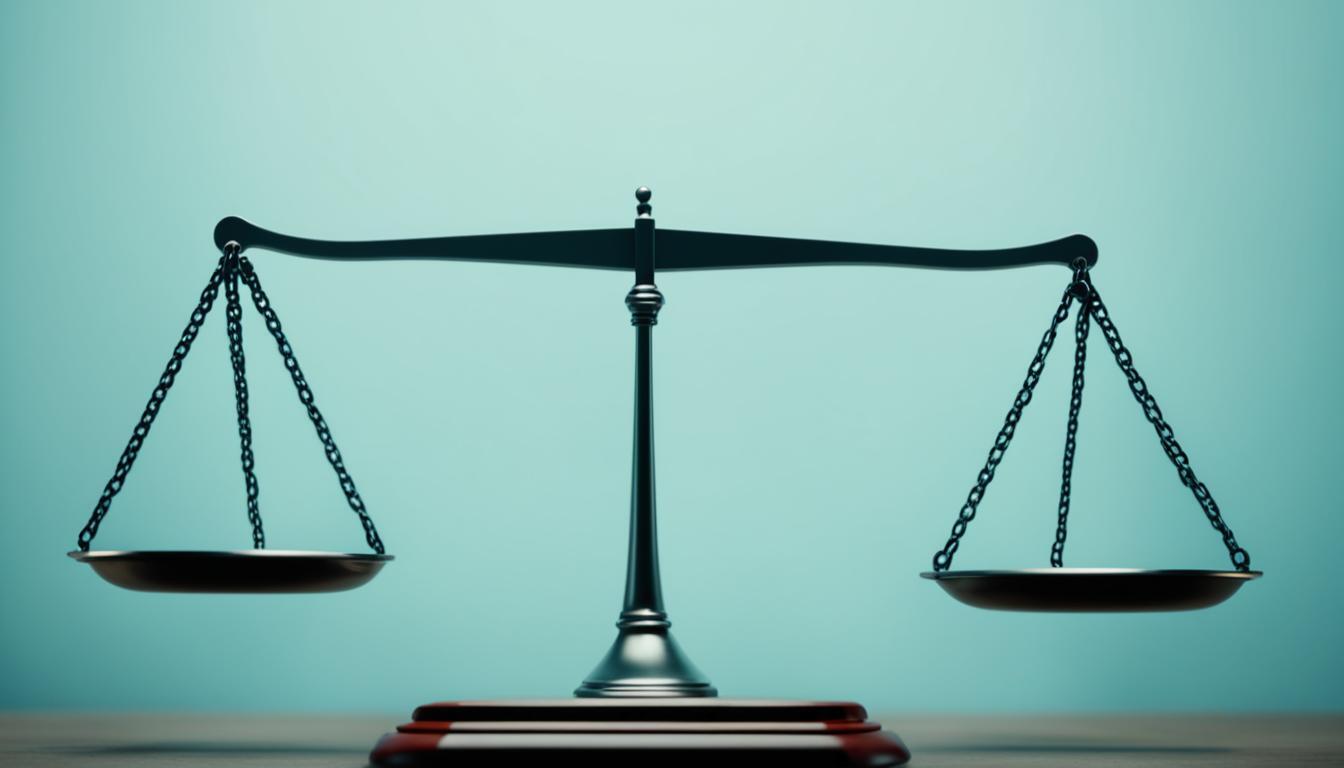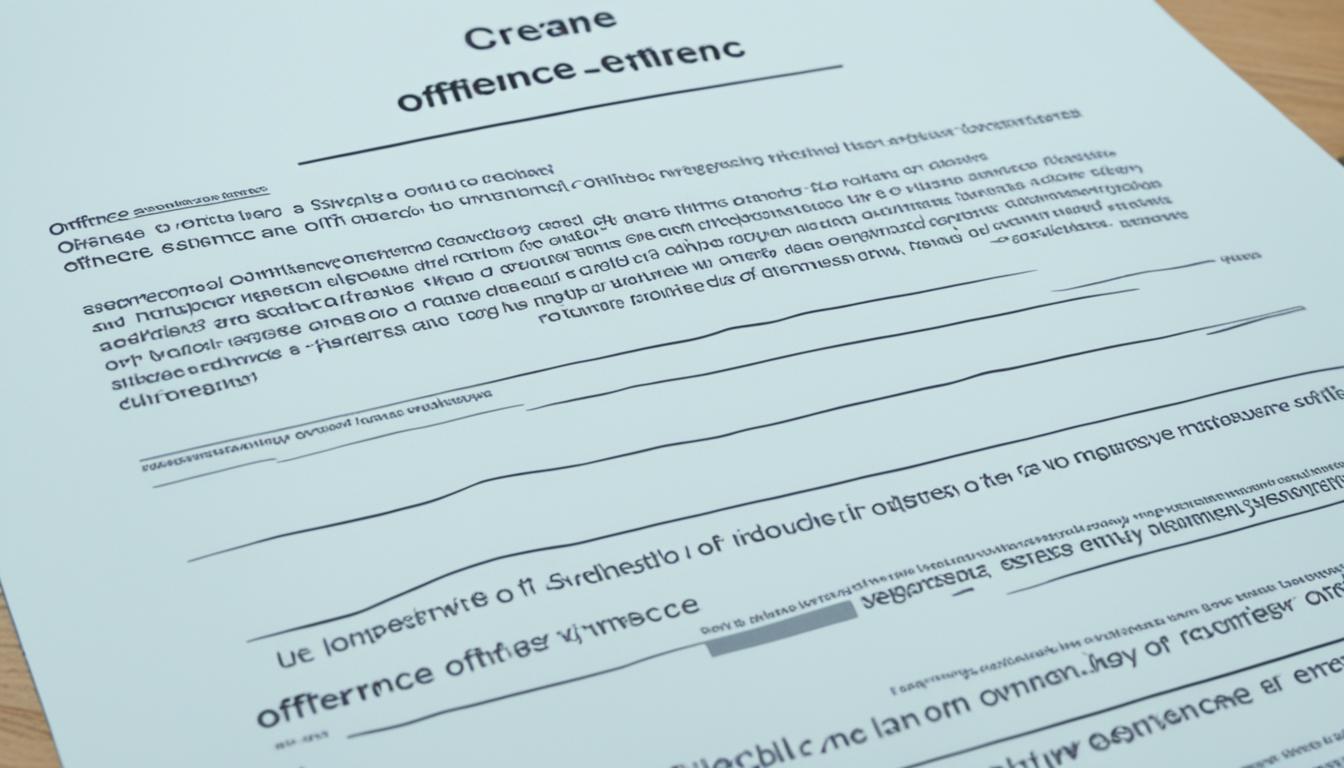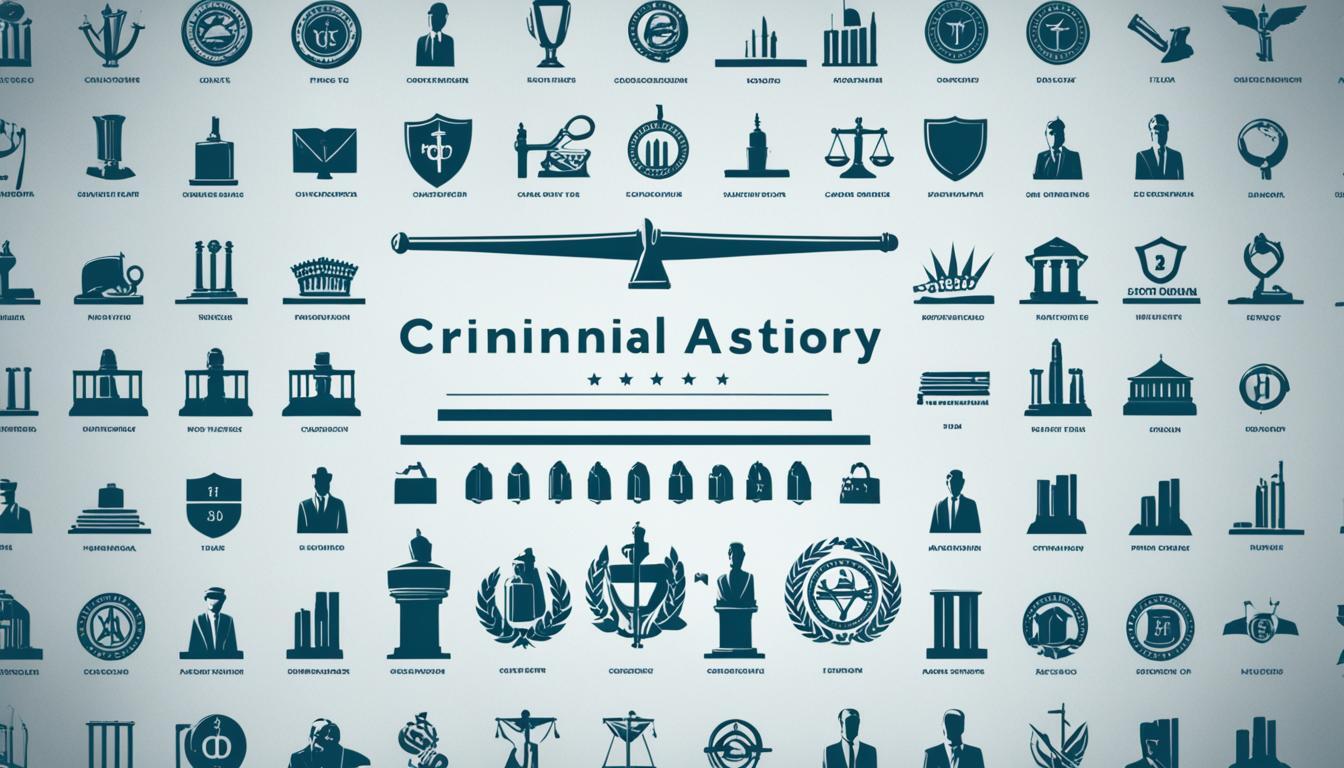Understanding What Is a Misdemeanor Charge
Did you know that a significant portion of criminal offenses fall under the category of misdemeanors? In Canada, misdemeanors are referred to as summary offenses and are generally punishable by fines or short-term imprisonment. Understanding what constitutes a misdemeanor charge is essential, as it impacts the potential penalties and consequences you may face if convicted. Let’s take a closer look at what misdemeanors are and what you need to know about them.
Key Takeaways:
- A misdemeanor is a type of criminal offense that is less serious than a felony.
- Misdemeanor charges are generally punishable by fines or short-term imprisonment in Canada.
- Examples of misdemeanor offenses include DUI offenses, reckless driving, trespassing, simple assault, and possession of certain controlled substances.
- Misdemeanors can still result in jail time and leave you with a criminal record that can impact your future opportunities.
- Seeking legal representation from an experienced criminal defense lawyer is crucial when facing misdemeanor charges.
Differences Between Misdemeanor and Felony Offenses
When it comes to criminal offenses, understanding the distinctions between misdemeanors and felonies is crucial. Misdemeanor offenses are considered less serious compared to felony offenses, and they entail different penalties and consequences.
A conviction for a misdemeanor typically results in penalties that include:
- Less than a year of incarceration, such as county jail time
- Fines that vary depending on the nature and severity of the offense
- Community service, where individuals are required to contribute a designated number of hours to their community
- Driver’s license suspension for certain misdemeanor offenses, such as DUI
- Participation in a drug or alcohol treatment program if the misdemeanor is related to controlled substances or impaired driving
On the other hand, felony offenses carry more severe penalties:
- More than a year of incarceration in a state or federal prison facility
- Significantly higher fines compared to misdemeanor penalties
- The loss of certain rights and opportunities, such as the right to vote or possess firearms
- Lengthy probation periods and mandatory supervision upon release
It is important to note that while misdemeanor offenses are considered less serious, they can still have a significant impact on an individual’s life. A misdemeanor conviction can result in a criminal record, which can affect employment opportunities, professional licenses, and even housing options.

Classifications of Misdemeanor Offenses
Misdemeanor offenses are categorized into different classes or categories in many states. These classifications determine the severity of the offense and the corresponding penalties. While the specific classifications and penalties may vary from state to state, they provide a framework for administering justice.
In some states, misdemeanor offenses are divided into classes such as:
- Class A misdemeanors: Punishable by up to a year of imprisonment
- Class B misdemeanors: Punishable by up to six months of imprisonment
- Class C misdemeanors: Punishable by up to 30 days of imprisonment
It is important to note that these classifications are not universal and can differ depending on the jurisdiction. Therefore, it is essential to consult the specific laws and regulations of the relevant jurisdiction to understand the exact classifications and corresponding penalties.
Now, let’s explore how misdemeanor offenses are handled in Canada. In Canada, misdemeanor offenses are referred to as summary offenses, which are generally less serious than indictable offenses. Summary offenses are punishable by fines, short-term imprisonment, or a combination of both.

| Punishment | Summary Offenses (Misdemeanor) in Canada |
|---|---|
| Fines | Summary offenses may be punished by fines ranging from a few hundred to several thousand dollars, depending on the offense and the court’s discretion. |
| Short-Term Imprisonment | Summary offenses can result in imprisonment for a period of up to six months, depending on the seriousness of the offense and the circumstances surrounding it. |
It is crucial to consult Canadian criminal law and seek legal counsel to fully understand the specific penalties and classifications for summary offenses in different provinces and territories in Canada.
When Will You Be Charged With a Misdemeanor?
If you find yourself in a situation where you might have violated a law, you could potentially be charged with a misdemeanor. The decision to charge you with a misdemeanor depends on several factors, including the nature and severity of the offense, as well as the presence of aggravating circumstances. Ultimately, prosecutors have some discretion in determining whether a misdemeanor charge is appropriate in your case.
When evaluating whether to charge you with a misdemeanor or a different offense classification, prosecutors will consider the following criteria:
- The nature of the offense: Misdemeanor charges are typically reserved for less serious crimes, such as minor theft, simple assault, or certain drug-related offenses. If your alleged offense falls within this range of less severe crimes, you may be charged with a misdemeanor.
- The severity of the offense: While misdemeanors are generally considered less serious than felony offenses, the level of harm or threat caused by your actions will be taken into account. If your alleged offense resulted in minimal harm or posed a low level of danger, it may be classified as a misdemeanor.
- The presence of aggravating circumstances: Certain factors can elevate the seriousness of an offense and warrant a different classification. Aggravating circumstances, such as prior criminal history, the use of a weapon, or harm caused to a vulnerable individual, may lead to a more severe charge rather than a misdemeanor.
It’s important to note that the criteria for misdemeanor charges can vary depending on your jurisdiction and the specific laws in place. The decision to charge you with a misdemeanor ultimately rests with the prosecutor, who assesses the details of your case and applies the relevant legal criteria to determine the appropriate offense classification.
| Criteria | Explanation |
|---|---|
| The nature of the offense | The type of crime committed, such as theft, assault, or drug-related offenses. |
| The severity of the offense | The level of harm or threat caused by the actions. |
| The presence of aggravating circumstances | Factors that increase the seriousness of the offense, such as prior criminal history or use of a weapon. |
Misdemeanor Charge Criteria Breakdown:
- Nature of the Offense: Misdemeanor charges typically apply to less serious crimes, such as minor theft, simple assault, or certain drug-related offenses.
- Severity of the Offense: The extent of harm or danger caused by the actions plays a role in determining if a misdemeanor charge is appropriate.
- Aggravating Circumstances: Factors such as prior criminal history, use of a weapon, or harm caused to a vulnerable individual can lead to a more severe charge.
Understanding the criteria used to determine misdemeanor charges can provide insight into the potential legal consequences you may face. If you find yourself charged with a misdemeanor, consulting with a qualified criminal defense lawyer is essential to understand your rights and explore possible defense strategies.
Penalties for Misdemeanors
When it comes to misdemeanor offenses, the penalties can vary based on the specific details of the crime and the jurisdiction in which it occurred. If convicted of a misdemeanor, there are several consequences you may face:
- Jail Time: Misdemeanor offenses typically carry a maximum sentence of less than one year in jail.
- Fines: A judge may impose fines as a penalty for the misdemeanor conviction.
- Community Service: In some cases, the court may order community service as part of the punishment.
- Driver’s License Suspension: Depending on the nature of the offense, your driver’s license may be suspended for a period of time.
- Participation in a Drug or Alcohol Treatment Program: If the misdemeanor involves substance abuse, you may be required to attend a treatment program.
The specific penalties you may face for a misdemeanor offense will be determined by the laws of the state or province where the offense occurred. It is important to understand the potential consequences and consult with a legal professional for guidance specific to your situation.
How Serious Are Misdemeanor Charges?
Misdemeanor charges should not be taken lightly as they can have significant consequences. Despite being less serious than felony offenses, misdemeanors can still result in jail time and leave you with a criminal record that can impact your future opportunities.
When convicted of a misdemeanor, the potential penalties may include imprisonment for a period of less than a year, fines, community service, probation, mandatory counseling or treatment programs, and even the suspension of your driver’s license.
It is crucial to understand the seriousness of these charges and the long-term implications they can have on your life. Having a criminal record can limit your employment prospects, affect your ability to secure housing, and cause difficulties in obtaining loans or licenses.
Repeat misdemeanor offenses can escalate in severity, leading to harsher penalties or even felony charges. This emphasizes the importance of seeking legal guidance and exploring your options to mitigate the potential consequences.
If you are facing misdemeanor charges, it is essential to consult with an experienced criminal defense lawyer who can provide you with sound legal advice and represent your interests. They will guide you through the legal process, explain the potential outcomes, and help build a strong defense strategy tailored to your case.
An attorney knowledgeable in misdemeanor law can assess the evidence against you, challenge the validity of the charges, negotiate with the prosecutor for a lesser charge or reduced sentence, and advocate in court on your behalf.
Remember, taking misdemeanor charges seriously and seeking appropriate legal representation will give you the best chance of minimizing the severity of the penalties and protecting your rights, reputation, and future opportunities.
Misdemeanor Charges and Legal Representation
When facing misdemeanor charges, it is crucial to seek the representation of an experienced criminal defense lawyer. A skilled attorney can not only provide you with legal guidance but also offer valuable insights into your case. They will help you understand the nature of the charges, evaluate the evidence against you, and guide you through the legal process.
Having a legal professional by your side is vital, as they are familiar with the complexities of the legal system and can navigate it effectively on your behalf. They can pinpoint potential weaknesses in the prosecution’s case and develop a strong defense strategy to protect your rights and achieve the best possible outcome.
Depending on the circumstances surrounding your case, a seasoned criminal defense lawyer may be able to negotiate a plea bargain with the prosecution or present a compelling defense in court. This can help you avoid the most severe penalties associated with misdemeanor charges.
It is important to choose a lawyer who specializes in the specific type of misdemeanor offense you are charged with. Their expertise and experience in handling similar cases can significantly impact the outcome of your defense.
Remember, misdemeanor charges should not be taken lightly. They can lead to jail time, fines, and a permanent criminal record that can affect your future opportunities and reputation. By seeking legal representation, you are taking the necessary steps to protect your rights and increase your chances of a favorable outcome.
| Benefits of Legal Representation for Misdemeanor Charges |
|---|
| Expert legal guidance and support throughout the legal process |
| Understanding of the nature of the charges and potential consequences |
| Evaluation of the evidence against you and development of a strong defense strategy |
| Negotiation of plea bargains or presentation of a compelling defense in court |
| Minimization of potential penalties and long-term consequences |
| Protection of your rights and interests throughout the legal proceedings |
Conclusion
Understanding misdemeanor charges and the consequences of misdemeanor convictions is crucial for anyone facing these legal issues. Misdemeanor charges should not be taken lightly, as they can have significant impacts on your life. It is important to have a clear understanding of what constitutes a misdemeanor offense and the potential penalties associated with it.
When facing a misdemeanor charge, seeking legal representation is of utmost importance. By working with an experienced criminal defense lawyer, you can navigate the complex legal process with guidance and support. A skilled attorney will help you evaluate the evidence against you, develop a strong defense strategy, and strive for the best possible outcome in your case.
Remember, taking misdemeanor charges seriously from the start and seeking appropriate legal guidance can make a significant difference in protecting your rights and future opportunities. Do not hesitate to consult with a qualified attorney who specializes in handling misdemeanor cases to ensure the best possible defense and to mitigate the potential consequences of a misdemeanor conviction.



















Post Comment Cancel reply